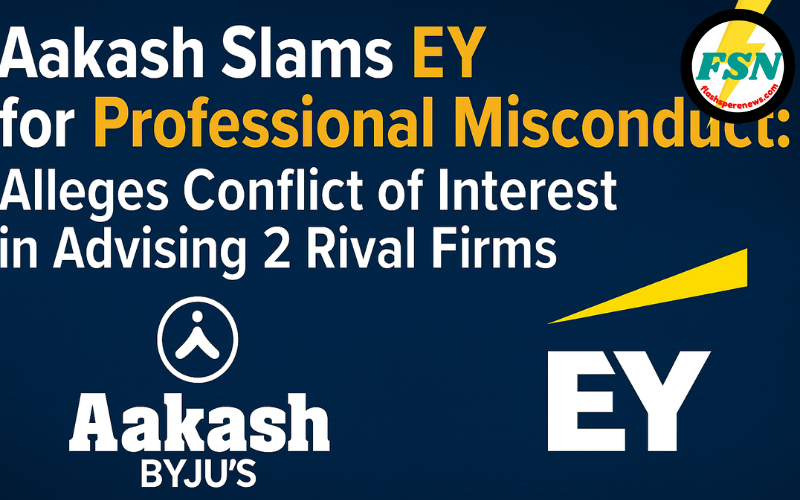Aakash Slams EY Over Conflict of Interest Allegations: Sparks Industry-Wide Debate on Professional Ethics
In a controversy that has sent ripples across the Indian corporate landscape, Aakash Educational Services Limited (AESL) has levelled serious allegations against global consulting giant Ernst & Young (EY), accusing the firm of professional misconduct and operating under a glaring conflict of interest. The accusation — which claims EY simultaneously advised two rival entities involved in the same business domain — has reignited conversations about the ethical boundaries of consultancy practices in India.
The issue came to light following a legal notice issued by AESL, in which the education company asserted that EY had breached confidentiality and acted in a manner detrimental to Aakash’s commercial interests. According to Aakash, EY was advising both AESL and its competitor, Sri Chaitanya, in their respective merger and acquisition strategies — a move that AESL argues creates an irreconcilable conflict of interest.
This development comes at a critical juncture in the education sector, particularly within the test preparation and ed-tech ecosystem, where consolidation and strategic partnerships have been central to business growth. The gravity of the matter is compounded by the stature of the parties involved and the high stakes associated with their business trajectories.
Aakash Slams EY for Double-Dealing: A Legal and Ethical Quagmire
The controversy surrounding EY and its alleged dual advisory roles is far more than a contractual disagreement — it strikes at the heart of ethical conduct in corporate advisory services. Aakash Slams EY for what it terms as “double-dealing,” arguing that the consultancy failed to uphold its fiduciary duties by working with its direct rival simultaneously.
The legal notice served by Aakash outlines that EY’s alleged actions could lead to an unfair sharing of proprietary information, business insights, and strategic planning, which may give undue advantage to one player over the other. Aakash Slams EY’s handling of sensitive information and claims that such actions violate industry norms and may have long-lasting repercussions on trust within the consultancy domain.
Industry experts believe that this case could serve as a litmus test for corporate governance standards in India. It raises the question: how do we ensure impartiality in a space where consultants often juggle multiple clients within the same industry? Aakash Slams EY with what appears to be substantial legal documentation and evidence, which may form the basis for regulatory scrutiny and perhaps even legal reforms in the future.
Adding fuel to the fire, several former clients of EY have come forward, anonymously citing similar concerns in the past, though never formally raised. This lends weight to Aakash’s claim and points to a potentially systemic issue in the way large consultancy firms manage conflicts of interest. Aakash Slams EY not just for a one-off ethical slip, but for what it characterizes as an ingrained culture of prioritizing business expansion over client trust.
This narrative has drawn comparisons to previous global consultancy scandals where firms failed to ring-fence client operations. Aakash’s move may thus be seen not only as a legal stand but as an effort to position itself as a guardian of ethical standards in Indian ed-tech.
Aakash Slams EY: Corporate Trust and Reputational Risk at Stake
As news of the accusation spreads, both EY and Aakash are under immense public and media scrutiny. For EY, whose global reputation is built on professionalism and confidentiality, these allegations — if proven — could have serious reputational implications. Aakash Slams the consulting giant with claims that could potentially derail major deals, influence investor sentiment, and reshape the perception of big consultancy firms in the Indian market.
The test preparation market in India, led by players like Aakash, Sri Chaitanya, and others, is witnessing rapid growth and consolidation. These transactions often require intricate advisory services that demand the highest levels of trust and discretion. By alleging that EY advised its closest competitor in a sensitive business deal, Aakash Slams the consultant for crossing ethical lines and compromising the spirit of fair market practices.
Legal analysts suggest that if these claims are validated in court, the ramifications could go beyond EY. It could lead to calls for a regulatory framework governing the role of consultants, their client relationships, and the penalties for violating confidentiality agreements. Reputational damage in consultancy can be long-lasting, and clients often base their choice of advisory partners on credibility, trust, and integrity.
Adding to the complexity is the potential fallout within EY’s internal teams. Multiple sources claim that the legal notice has triggered an internal review, possibly involving audits, emails, contracts, and inter-departmental communication. Aakash Slams EY in such a way that any internal lapse, even inadvertent, could magnify the consequences.
Stakeholders in the corporate world are closely monitoring how EY’s management handles the crisis, including how they communicate with existing clients, regulators, and the general public. The next few months could be crucial in determining whether EY emerges relatively unscathed or if its Indian operations suffer permanent damage.
Aakash Slams EY: What This Means for India’s Consulting Industry
The broader implications of this dispute are deeply intertwined with the integrity of the consulting industry in India. Aakash Slams EY with accusations that underscore a systemic issue — the lack of stringent regulatory oversight in consultancy engagements. At present, most consulting agreements rely heavily on internal codes of conduct and client-signed NDAs, rather than binding statutory regulations.
This opens up a vulnerable gap in compliance. Aakash Slams the current system as being “too lenient,” allowing top-tier firms to operate with minimal accountability. If proven true, EY’s involvement in this dual advisory role could be a watershed moment that pushes the industry toward higher compliance standards. Many stakeholders, including corporate clients and policymakers, may begin advocating for structural reforms in consultancy operations.
Moreover, this could also catalyze the rise of smaller, more transparent consulting firms that offer single-client domain exclusivity. Aakash Slams EY in a manner that questions the entire operational philosophy of large-scale consultancies, which often juggle competing interests under a single roof.

A nationwide survey conducted shortly after the news broke revealed that over 68% of business leaders believe consultancy firms should be mandated to declare conflict of interest scenarios before onboarding any client. This indicates strong sentiment in favor of reform, one which Aakash’s case may ultimately help usher in.
Analysts also point out the need for a third-party watchdog, possibly under the aegis of a financial regulator or an independent industry body, to ensure transparency in client advisory relationships. Aakash Slams EY with vigor, and in doing so, potentially paves the way for meaningful industry self-regulation.
Aakash Slams EY: Investor Confidence and Market Sentiment in Flux
Beyond reputational damage, this controversy is already influencing investor sentiment. Aakash Slams EY in a move that may make venture capitalists and private equity players more cautious while engaging advisors for high-stakes deals. The ed-tech sector, which has witnessed massive inflows in recent years, might now demand stricter advisory disclosures before finalizing transactions.
Investors backing both Aakash and its rivals are likely watching this closely, knowing that consultancy integrity directly impacts the valuation and success of merger talks, funding rounds, and market expansion. Aakash Slams EY with allegations that have led to murmurs of a possible internal audit within the consulting firm. According to industry sources, there may be internal reviews already underway to determine whether any breach of confidentiality or advisory mismanagement occurred.
Financial analysts are keeping a close eye on how this saga unfolds, especially considering that both Aakash and Sri Chaitanya are major players backed by substantial investors. Aakash Slams EY in ways that suggest this may not be an isolated event but rather a reflection of broader lapses in due diligence processes.
Public perception also plays a major role. Social media platforms are abuzz with discussions on the topic, with many users questioning the ethics of corporate giants and whether India’s booming ed-tech space is being fairly served by global consultants. Hashtags like #AakashSlamsEY and #ConsultancyEthics have been trending on Twitter and LinkedIn, further amplifying the conversation.
Digital influencers in business and law are also contributing their perspectives, increasing visibility and pressure on both EY and the industry at large. Aakash Slams EY has transcended its legal confines to become a corporate culture flashpoint.
Aakash Slams EY: Legal Path Forward and Industry Reforms Looming
Legal action seems imminent. Aakash Slams EY by laying out what it describes as a “clear violation” of client trust. According to legal experts familiar with the case, AESL may pursue action under provisions of contract law, breach of confidentiality, and ethical violations. EY, meanwhile, is expected to respond formally to these allegations, possibly defending its conduct or citing internal firewalls that prevent information leakage between teams.
Aakash Slams EY not only to seek redressal but to send a broader message across industries — that firms engaging in consultancy should be held to the highest standards of ethics and integrity. As the legal process unfolds, regulators like SEBI and ICAI may step in to assess if any financial regulations or chartered accountancy guidelines were violated.
There are also indications that parliamentary discussions may be initiated around this topic, particularly with rising public interest and media pressure. Several MPs and industry bodies have begun calling for new guidelines to be drafted for consultancy firms operating in India, especially those with international affiliations.
Aakash Slams EY with the aim of setting a precedent. If successful, this case may push for a public registry of conflict-of-interest declarations, mandatory client separation clauses, and more robust compliance policies within consultancy firms. Such steps could transform India’s corporate advisory landscape significantly.
Law firms representing various clients have started drafting revised confidentiality clauses and conflict-of-interest declarations to prevent similar mishaps. Aakash Slams EY is already reshaping industry norms, even as the court case is still unfolding.
Conclusion: Aakash Slams EY — The Battle for Business Ethics Has Begun
The battle lines have been drawn. With Aakash Slams EY becoming a dominant headline across news portals and business circles, this legal and ethical showdown is set to redefine the way consultancy firms operate in India. What began as a client grievance is now morphing into a full-scale industry reckoning, where values like integrity, impartiality, and trust are being put to the test.
Whether EY is found guilty or not, Aakash Slams has already succeeded in spotlighting a critical issue that has long remained under the radar. The outcome of this case will likely reverberate across boardrooms, legal chambers, and investor meetings in the months to come.
In a time where transparency and trust are key to business success, Aakash Slams is more than just an accusation — it’s a call for accountability in corporate India. The coming weeks will be crucial, not only for AESL and EY, but for the future of corporate ethics in India at large.
The case may even influence academic curriculums at top Indian business schools, with future leaders learning from real-world instances of corporate misconduct. Regardless of the final ruling, Aakash Slams EY will be remembered as a turning point in India’s corporate conscience — a case that triggered soul-searching in an industry built on advice, trust, and discretion.
The Aakash Slams EY controversy is a mirror reflecting the urgency for reform in consultancy ethics, a dialogue that India’s corporate sector can no longer postpone.



